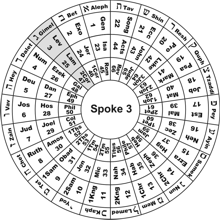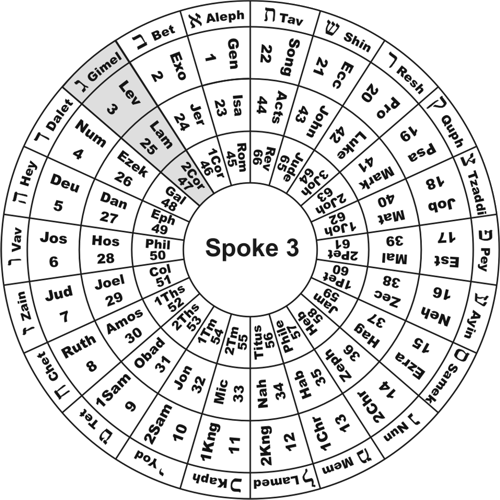Spoke 3 - Gimel - The Abundant Giver
But this I say, He which soweth
sparingly shall reap also sparingly; and he which soweth bountifully shall reap also
bountifully. Every man according as he purposeth in
his heart, so let him give; not grudgingly, or
of necessity: for God loveth a cheerful giver.
And God is able to make all grace abound toward
you; that ye, always having all sufficiency in all things, may abound to
every good work: As it is written, He hath dispersed abroad;
he hath given to the poor: his righteousness remaineth for ever.
2 Corinthians 9:6ff (Spoke 3, Cycle 3)

The name of the Third Letter comes
from גמל (Gamal, Camel). Its relation to English is obvious,
there being but a slight variation in pronunciation between Camel
and Gamal. Also, the third Latin letter "C" in camel corresponds to
the third Hebrew letter Gimel in Gamal.
Jewish tradition states that Gimel represents a rich
man running to give alms to a poor man, represented by the letter
Dalet. To those who
know Hebrew, this understanding is essentially "obvious" in that two
closly related words, gomel and
dal, mean Benefactor and
Poor, respectively. The words "Gomel - Dal" echo the alphabetic
sequence "Gimel - Dalet," suggesting Giving to the Poor.
In this tradition, Gimel symbolizes the ultimate cheerful
giver, so eager to share his abundant wealth that he chases the
poor, seeking any chance to give, to bless, and to bestow his riches upon
the needy. This understanding coheres with Scripture. In the great
alphabetic Psalm 119, the first Gimel verse states:
- AV Psalm 119:17 Deal bountifully (גמל,
gomal) with thy servant, that I may live, and
keep thy word.
The word gomal differs from the name of the third
letter only in pronunciation (the consonants are the same.)
Abundant Generosity is one of the great themes of the
Third Spoke. It reveals the character of the
Holy Spirit, our
Benefactor, the Giver of God's abundant
gifts. Indeed, the greatest gift of all is God Himself in the
Person of the Holy Spirit. He is both the Giver and the Gift itself.
This theme is explored in the article called
Poverty and Wealth.
Gomel also
means to give in the
sense of to reward, to recompense, or to repay , which can have
positive or negative sense depending on what is deserved. God used it in
Isaiah 3 when he said:
For Jerusalem is ruined, and Judah is fallen: because their tongue and
their doings are against the LORD, to provoke the eyes of his glory. The
shew of their countenance doth witness against them; and they declare
their sin as Sodom, they hide it not. Woe unto their soul! for they have
rewarded (גמלו, gamlu) evil unto themselves.
Say ye to the righteous, that it shall be well with him: for they shall eat the fruit of their
doings. Woe unto the wicked! it shall be ill with him: for the
reward (גמול, gamul) of his hands shall be given him.
Isaiah 3:8
The verses from Isaiah 3 demonstate the divine design of the chapter sequence of Isaiah, since it is here
that Gimel makes its
debut within Isaiah. Just as the
Second Letter Beyt first occurs in Isaiah 2,
so the Third Letter Gimel first occurs here in Isaiah 3.
These verses also contain a dense confluence of ideas related to the
Number Three and the Letter Gimel. They echo the Fall into sin recorded in
Genesis 3, the eating of fruit (created on Day 3
and closely associated with the Fall), and the
primary theme of Lamentations, the second book
on Spoke 3
which opens with these words mourning the Fall of Jerusalem (see Fullness of Divine Retribution):
How doth the city sit solitary, that
was full of people! how is she become as a widow! she that was great among
the nations, and princess among the provinces, how is she become
tributary! She weepeth sore in the night, and her tears are on her cheeks:
among all her lovers she hath none to comfort her: all
her friends have dealt treacherously with her, they are become her
enemies. Judah is gone into captivity because of affliction, and because
of great servitude: she dwelleth among the heathen, she
findeth no rest: all her persecutors overtook her between
the straits. The ways of Zion do mourn, because none come to the
solemn feasts: all her gates are desolate: her
priests sigh, her virgins are afflicted,
and she is in bitterness. Her adversaries are the chief, her enemies prosper;
for the LORD hath afflicted her for the multitude of her transgressions:
her children are gone into captivity before the enemy.
Lamentations 1:1ff (Spoke 3, Cycle 2)
Again, many concepts related to the Number 3 and the Letter Gimel converge in these verses. Jerusalem
falls into bondage and destruction because of "the multitude of her transgressions."
She is driven from Jerusalem to dwell amongst the heathen just
as Adam and Eve were driven from the Garden as the recompense of their
sin in Genesis 3. Just as Adam had to live
by "the sweat of his brow" after eating the forbidden fruit, so these exiles find
"no rest."
Of particular significance is the statement that "she hath none to comfort her," for this
touches upon another aspect of the great thematic river rushing through
Spoke 3, God the Holy Spirit, Our Comforter. In all the Bible, the
greatest density of the word comfort is found on in the opening
verses if 2 Corinthians on Spoke 3 (see The God of All Comfort). In contrast, the loss of the
God's comfort is emphasized five times in Lamentations, where Jeremiah
cries out with words such as Lamentations 1:16 (see Israel hath No Comforter!):
For these things I weep; mine eye, mine eye runneth down with water,
because the comforter that should relieve my soul is far from me: my children are
desolate, because the enemy prevailed. Zion spreadeth forth her hands, and
there is none to comfort her.
Lamentations 1:16 (Spoke 3, Cycle 2)
The set of ideas associated with Gimel are
clearly seen in this table that lists how the KJV translates two closely
related root words. (The frequency of each word is indicated by the
number that follows it.)
gemul (גמול)
(Strong's #1576) |
recompense 10, reward 3, benefit 2, given 1, deserve 1; |
gamal (גמל)
(Strong's #1580) |
wean 10, reward 8, dealt bountifully 4, do 4, bestowed 2, recompense 2, weaned child 2,
do good 1, requite 1, ripening 1, served 1, yielded 1 |
All of these ideas relate to the Holy Spirit, who
gives us God's abundant gifts, nurtures believers, convicts sinners of
their guilt, and comforts them when they repent.
|



